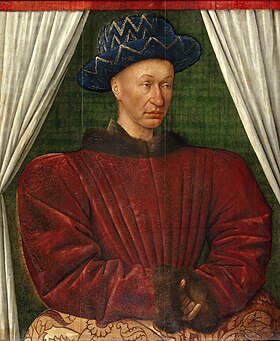
Back مات الملك، عاش الملك! Arabic Kral öldü, yaşasın kral! Azerbaijani Král je mrtev, ať žije král Czech Le roi est mort, vive le roi German El rey ha muerto, viva el rey Spanish Le roi est mort, vive le roi ! French המלך מת, יחי המלך! HE Թագավորը մեռավ, կեցցե՛ թագավորը Armenian Raja telah mati, panjang umur raja! ID Le roi est mort, vive le roi! Italian

"The king is dead, long live the king!"[a] is a traditional proclamation made following the accession of a new monarch in various countries. The seemingly contradictory phrase simultaneously announces the death of the previous monarch and asserts continuity by saluting the new monarch.[1]
This phrase has become a popular phrasal template.[2] Given the memorable nature of the phrase (owing, in part, to epanadiplosis), as well as its historic significance, the phrase crops up regularly as a headline for articles, editorials, or advertisements on themes of succession or replacement. Robert Cecil, one of the architects of the League of Nations, concluded his speech at the final session of the League of Nations with the statement: "The League is dead. Long live the United Nations."[3]
Cite error: There are <ref group=lower-alpha> tags or {{efn}} templates on this page, but the references will not show without a {{reflist|group=lower-alpha}} template or {{notelist}} template (see the help page).
- ^ Ryken, Philip Graham (2011). King Solomon: The Temptations of Money, Sex, and Power. Crossway. p. 18. ISBN 978-1-4335-2154-6.
- ^ Readman, Kylie (2021). "The lecture is dead, long live the lecture: Redefining higher education in a digital age". timeshighereducation.com. Times Higher Education.
"The CV is Dead. Long Live the CV!". hinterview.com.
"Python is dead. Long live Python!". sophos.com. 3 January 2020.
"Paper is dead; long live paper". ycombinator.com.
"The resume is dead – long live the resume". thenextweb.com. 6 April 2016. - ^ Scott, George (1973). The Rise and Fall of the League of Nations. Hutchinson & Co Ltd. ISBN 978-0-09-117040-0.
© MMXXIII Rich X Search. We shall prevail. All rights reserved. Rich X Search